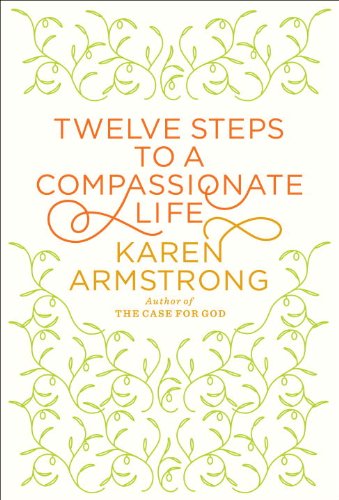
 January, the month of New Year's resolutions, has arrived. But this year, instead of heading to the gym or Weight Watchers, consider reading a book that may change fundamentally the way you regard the world and act in it. Former nun and distinguished historian of religion Karen Armstrong (A History of God) has written one that blends a sophisticated discussion of the concept of compassion in various faith traditions with elements of a conventional self-help manual.
January, the month of New Year's resolutions, has arrived. But this year, instead of heading to the gym or Weight Watchers, consider reading a book that may change fundamentally the way you regard the world and act in it. Former nun and distinguished historian of religion Karen Armstrong (A History of God) has written one that blends a sophisticated discussion of the concept of compassion in various faith traditions with elements of a conventional self-help manual.
In 2007, Armstrong was informed she had won a prize that, in addition to cash, granted her a wish for a better world. She opted to ask for assistance in creating a Charter for Compassion that "would restore compassion to the heart of religious and moral life." Dating the first formulation of the Golden Rule to Confucius, nearly half a millennium before the birth of Jesus, Armstrong answers, if only obliquely, the charges of critics who see religion as a force for intolerance. To her, "At their best, all religious, philosophical, and ethical traditions are based on principles of compassion."
Although the 12-step approach is well known in the treatment of various addictions, Armstrong doesn't draw explicitly on that formulation. Despite its religious foundation, for example, she is clear that her program doesn't depend upon belief in a "higher power." Instead, she offers a series of intensely practical but increasingly challenging steps to achieve a transformation she admits is "slow, undramatic and incremental," as we battle against our inherent egotism expressed in the "Four Fs" of instinctive behavior--feeding, fighting, fleeing and what she decorously calls reproduction.
Armstrong starts simply with the admonition to "learn about compassion," a step she makes easier by exploring its roots in the world's major faiths (including an especially thoughtful and important discussion of its place in Islam). From there she proceeds through practices like compassion for oneself, mindfulness and compassionate speech. Each step builds upon all that have gone before, ascending to what she calls the "supreme test of compassion," the ability to love one's enemies. Although she makes occasional references to a meditation practice, its description is somewhat vague and that may be disappointing to those who come to the book expecting an emphasis on self-help.
While Armstrong is not so naïve as to think her program possesses some magical transformative power, she is committed to the notion that even tentative steps in the direction of living more compassionately, if taken seriously and practiced widely, have the power to make the world a more hospitable place. A new year lies before you like an empty page. What better time is there to take her up on that challenge, and what do you have to lose if you do?--Harvey Freedenberg
Shelf Talker: Religious historian Karen Armstrong offers a guide to living more compassionately.

